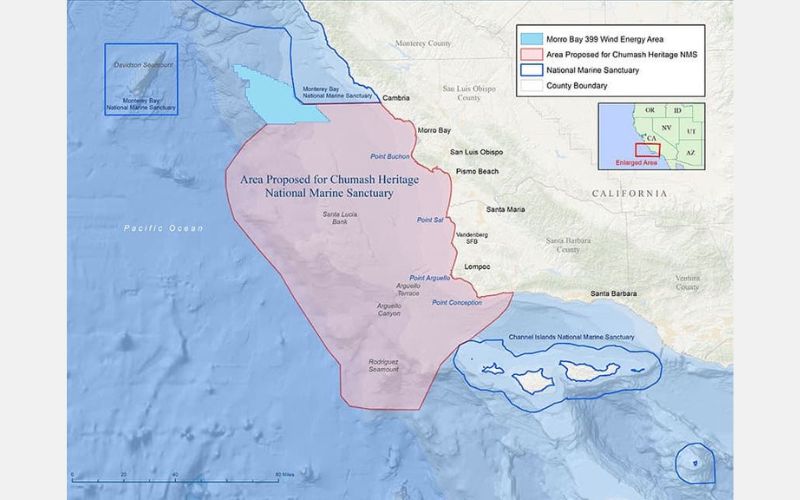
- Details
- By Kaili Berg
With the release of the Final Environmental Impact Statement (FEIS) by the National Oceanic and Atmospheric Administration (NOAA), this proposed sanctuary along California’s central coast is entering its final stage before official designation.
This will be the first marine sanctuary in the U.S. proposed by an Indigenous group, specifically the Northern Chumash Tribe. The sanctuary would cover 4,543 square miles of ocean along 116 miles of California’s central coast, making it the third largest in the National Marine Sanctuary System.
For over 40 years, the Northern Chumash Tribe has been working to establish this sanctuary. It represents their deep connection to the waters of the California coast, which have been part of their cultural and spiritual heritage for centuries.
The Biden administration has supported this effort, recognizing the importance of Indigenous-led conservation. During a public comment period, over 110,000 comments were submitted, with more than 99 percent in favor of the sanctuary.
The sanctuary will safeguard biodiversity and marine life, including whales, dolphins, seabirds, and various species that are crucial to the ecosystem’s health.
Beyond its environmental significance, the sanctuary will also serve as a living monument to the Chumash people and their connection to the ocean. This is a rare case where cultural preservation and environmental conservation are intertwined, setting a new precedent for future conservation efforts in the U.S.
Lauren Bogard, Director of Campaigns and Special Projects at the Center for Western Priorities, released a statement following the FEIS announcement stating the importance of this moment.
“We would not be celebrating this important milestone today were it not for the decades of leadership from the Northern Chumash Tribe and other California Indigenous people and community members who have worked tirelessly to establish the nation’s first Indigenous-proposed marine sanctuary,” said Bogard. “Thank you, President Biden, for listening to the Tribal and community leaders who have been leading this effort for the past 40 years.”
NOAA’s final review emphasizes that the sanctuary will be managed in partnership with Indigenous communities, ensuring that their voices remain central in protecting these waters. The plan focuses on preserving cultural resources, encouraging sustainable tourism, and supporting marine research.
The official designation of the Chumash Heritage National Marine Sanctuary is expected later this year. Once established, it will serve as an important model for future conservation efforts that combine environmental protection with cultural preservation.
More Stories Like This
Gwich'in Tribal Governments Submit Comments Challenging Fish and Wildlife Service's Inadequate Environmental Review of Arctic Refuge Snow RoadRappahannock Tribe Challenges 9M-Gallon Water Plan
Feds release draft long-term plans for Colorado River management
Apache Leader Walks 60 Miles to Court Hearing That Will Decide Fate of Sacred Oak Flat
Rappahannock Tribe Raises Sovereignty and Environmental Concerns Over Caroline County Water Permit
Help us defend tribal sovereignty.
At Native News Online, our mission is rooted in telling the stories that strengthen sovereignty and uplift Indigenous voices — not just at year’s end, but every single day.
Because of your generosity last year, we were able to keep our reporters on the ground in tribal communities, at national gatherings and in the halls of Congress — covering the issues that matter most to Indian Country: sovereignty, culture, education, health and economic opportunity.
That support sustained us through a tough year in 2025. Now, as we look to the year ahead, we need your help right now to ensure warrior journalism remains strong — reporting that defends tribal sovereignty, amplifies Native truth, and holds power accountable.
 The stakes couldn't be higher. Your support keeps Native voices heard, Native stories told and Native sovereignty defended.
The stakes couldn't be higher. Your support keeps Native voices heard, Native stories told and Native sovereignty defended.
Stand with Warrior Journalism today.
Levi Rickert (Potawatomi), Editor & Publisher


